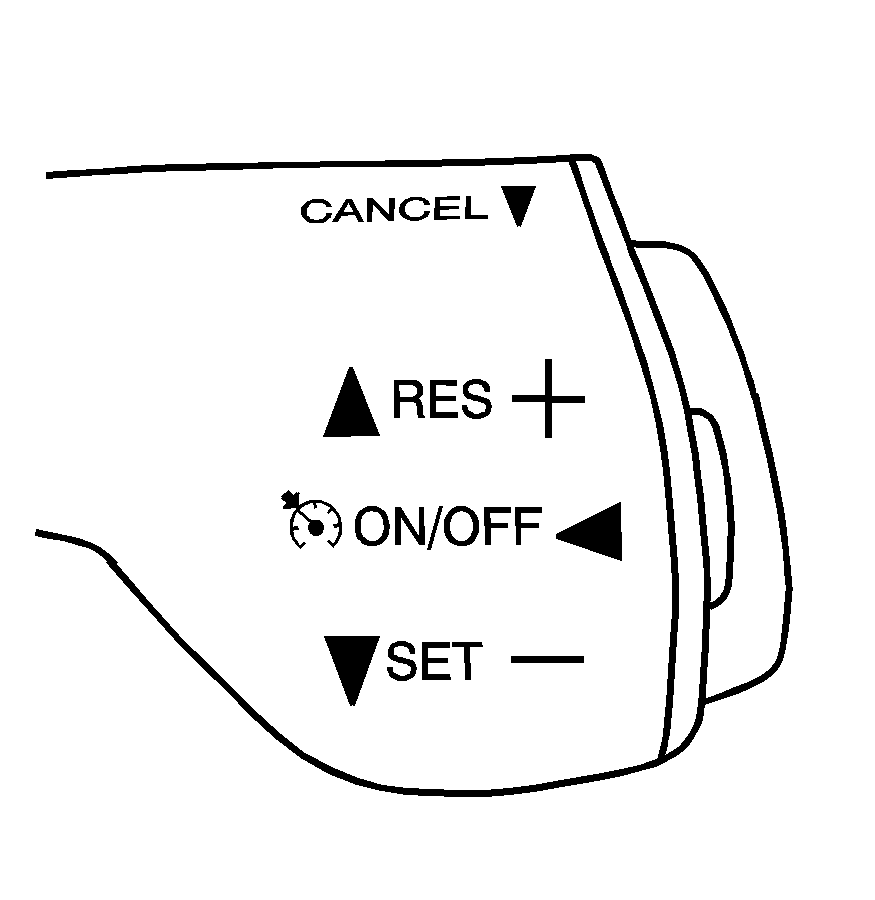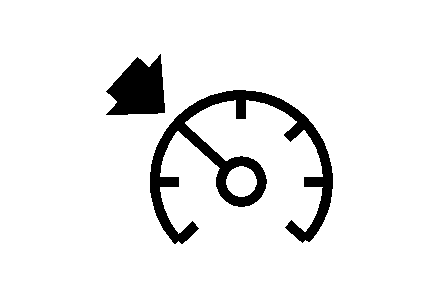Caution: Cruise control can be dangerous where you cannot drive safely at a steady speed. So, do not use the cruise control on winding roads or in heavy traffic.
Cruise control can be dangerous on slippery roads. On such roads, fast changes in tire traction can cause excessive wheel slip, and you could lose control. Do not use cruise control on slippery roads.
The cruise control lever is located below the windshield wiper control on the right side of the steering wheel.
RES + (Resume/Accelerate): Push the lever up to resume the cruise control speed, or to accelerate when passing another vehicle.(CRUISE CONTROL) ON/OFF : Press the button on the end of the lever to turn the cruise control on. Press it again to turn cruise control off.
SET -- (Set/Coast/Decelerate): Push the lever down to set the cruise speed. If the cruise speed is already set this position can be used to coast or decelerate from a higher speed.
CANCEL : Pull the lever to cancel the cruise control speed.
Cruise control allows a speed of approximately 25 mph (40 km/h) or more to be maintained without keeping your foot on the accelerator. This is helpful on long trips. Cruise control does not work at speeds below about 25 mph (40 km/h).
When the brakes are applied, the cruise control shuts off.
If the vehicle is in cruise control and the Traction Control System (TCS) begins to limit wheel spin, the cruise control will automatically disengage. See Traction Control System (TCS) . When road conditions allow, the cruise control can be used again.
Setting Cruise Control
Caution: If you leave your cruise control on when you are not using cruise, you might hit a button and go into cruise when you do not want to. You could be startled and even lose control. Keep the cruise control switch off until you want to use cruise control.
- Push the button at the end of the cruise control lever to turn the cruise control on.
- Accelerate to the desired speed.
- Push down on the cruise control lever and release it. This will set the speed in cruise control.
- Remove your foot from the accelerator pedal.

This symbol will appear on the instrument panel cluster when the cruise control is set.
This symbol will disappear when the brakes are applied or the cruise control is cancelled. It will reappear when the set cruise speed is resumed.
Resuming a Set Speed
If the cruise control is set at a desired speed and then the brakes are applied, the cruise control shuts off. But the cruise control does not need to be reset.
Once the vehicle is traveling approximately 25 mph (40 km/h) or more, the cruise control lever can be pushed upward toward the plus (resume/accelerate) position to return to the preset cruise speed.
The vehicle will return to and stay at the preset cruise speed. If the cruise control lever is pushed up and held toward the plus (resume/accelerate) position, the vehicle speed will increase until the lever is released or the brakes are applied. Do not continue to hold the lever in the plus (resume/accelerate) position, unless a faster speed is desired.
Increasing Speed While Using Cruise Control
There are two ways to go to a higher speed:
| • | Use the accelerator pedal to get to the higher speed. Push up on the cruise control lever toward the plus (resume/accelerate) position, then release the lever and take your foot off the accelerator pedal. The vehicle will now cruise at the higher speed. |
| • | Push up and hold the cruise control lever toward the plus (resume/accelerate) position until the vehicle reaches the desired speed. Then release the cruise control lever. To increase the vehicle's speed in very small amounts, push up briefly on the cruise control lever and release it. Each time this is done, the vehicle will speed up approximately one mph (1.6 km/h). |
The acceleration feature will only work after the cruise control speed has been set by pushing the cruise control lever down to the set position.
Reducing Speed While Using Cruise Control
There are two ways to reduce the vehicle's speed while using cruise control:
| • | Push the cruise control lever downward toward the minus (set/coast/decelerate) position until a lower speed is reached, then release it. |
| • | To slow down in very small amounts, push the cruise control lever downward toward the minus (set/coast/decelerate) position briefly. Each time this is done, the vehicle will slow down approximately one mph (1.6 km/h). |
Passing Another Vehicle While Using Cruise Control
Use the accelerator pedal to increase the vehicle's speed. When you take your foot off the pedal, the vehicle will slow down to the cruise control speed set earlier.
Using Cruise Control on Hills
How well the cruise control will work on hills depends upon the vehicle's speed, its load, and the steepness of the hills. When going up steep hills, the accelerator pedal might have to be used in order to maintain the vehicle's speed. When going downhill, the brakes might have to be applied, or the transaxle might have to be shifted to a lower gear to keep the vehicle's speed down. Doing either of these things will take the vehicle out of cruise. It may be better not to use the cruise control if the brakes constantly have to be applied, or the vehicle continuously needs to be shifted to a lower gear.
Cancelling Cruise Control
To cancel a cruise control session, pull the cruise control lever forward, or step lightly on the brake pedal.
Doing either of these things will only end the current cruise control session, but the set speed will be retained in memory.
Push the button at the end of the cruise control lever to turn the system off.
Erasing Speed Memory
When the cruise control or the ignition is turned off, the cruise control set speed memory is erased.
